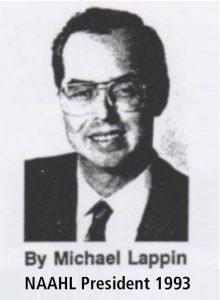
This article was in the inaugural newsletter of the National Association of Affordable Housing Lenders (NAAHL). Its message is more relevant today as ever, and guides the activities of MLappin and Associates.
If there is one theme that defines our country more than any, it is our capacity to_ form communities among diverse peoples. While this has never been easy, nor always successful, the measure of progress for our country is that we can build a civic life where people of different ethnic, religious, racial, and economic backgrounds can both live in peace and prosper in their individual pursuits.
The National Association of Affordable Housing Lenders (NAAHL) grew out of a belief that private capital has an essential role in the building and maintenance of our communities. This belief reflects the origin of our banking system whereby the savings of a community were used to serve the needs of its residents. This connection is still relevant, as capital provides a basic building block for meeting communities’ many housing and economic needs. This is especially true for lower income communities areas of special concern for NAAHL. Here, housing needs to be built and rebuilt, businesses need to grow, and dreams need to flourish. While our goal is to routinely provide capital for these needs, our challenge is to build a system that can meet this goal.
This perspective raises a series of questions on issues of public policy. What kind of financial products are needed in these communities? How can they be structured to both be accessible to borrowers and to provide reasonable investment returns commensurate with risk to the institutions? How does the regulatory environment affect the delivery of these financial products to communities? How can the financial markets accommodate broad community investment?
Capital does not work alone in communities. It works in conjunction with public programs, as well as within a community’s regulatory and economic policy framework. Hence, a broad range of topics that affect the economic wellbeing of lower income communities become important areas of discussion for lenders.
Issues regarding the type, process, and structure of public subsidies and their ability to leverage private funds are questioned. The relationship between housing and publicly mandated costs–real estate truces and water and sewer fees, for example–become an important concern. The effects of environmental and health mandates must be examined. Answers to the complex questions regarding lead paint remediation will have a major impact on our ability to rebuild our lower income urban communities.
With these issues at the forefront, financial institutions need not be defensive regarding their community role, but can take an important role at the table. Their traditional role as a protector and builder of a community’s economic base can be reasserted.
We hope NAAHL can act both as a focus for these issues · and as a source of information to educate our colleagues and our legislators. The national attention on community development lending provides an important platform for our views.
(NAAHL) is a nonprofit Organization for lenders that specialize in affordable housing finance. NAAHL facilitates communication among lenders and others active in financing low-and moderate-income housing to promote community development lending.
Published, Fall 1993